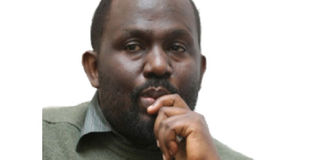Hello State House Uganda: Is anyone at home?

CHARLES ONYANGO-OBBO
Last week, several of some of the ills – impunity, incompetence, barbaric violence, folly - plaguing Uganda today came together dramatically in a single event.
First, widely read online entertainment platforms like TMZ were covering Uganda seriously for the first time, because controversial American hip hop star Kanye West (or just Ye) and his reality TV star wife Kim Kardashian are in the country, where Ye is recording an album.
Their audience is basically young Americans and people in the West, who probably don’t watch CNN, BBC, or read Ugandan newsites online, so their view of the country is formed by film and old history. To them, Uganda is still the land of Idi Amin, portrayed in the film The Last King of Scotland, that was filmed here.
Or, they also learnt about it from social media where the biggest story of Uganda in recent weeks has been the arrest and torture of MPs Robert Kyagulanyi (Bobi Wine), Fred Zaake, and over two dozen Opposition supporters in Arua in August.
Bobi Wine’s statement criticising Ye for hobnobbing with “dictator” Yoweri Museveni was also widely covered, as the view that his meeting with the President just white-washed a strongman, was shared by several rights groups.
But none of that was going to take away one of the Kampala government’s finest hours, as President Museveni also commissioned the iconic Source of the Nile Bridge.
It is the second longest cable-stayed bridge in East Africa after Tanzania’s Kigamboni Bridge, and a statement about economic and regional market integration intent that was widely and well covered.
And right in the middle of that came that viral, stomach-churning video of security men savagely beating Yusuf Kawooya on a Kampala street. Even by the standards of the brutality that Ugandans are now used to, it was unnerving.
All of a sudden, it was back to a familiar Ugandan, the one where security officers torture suspects – in the glare of phone cameras. Imagine what they do when there are no cameras, the conversation went.
The criticism of Ye hanging out with the leader of a menacing regime was validated. That new big youthful audience following the Ye and Kim story, could recognise this Uganda from the Last King of Scotland.”
ICT minister Frank Tumwebaze was befuddled enough to say the brutal attack could have been the work of enemies of the NRM out to tarnish its name.
If it’s true, it’s scarier that enemies of the NRM have grown so bold, they can descend upon a hapless citizen with guns in broad daylight in the middle of Kampala, bundle him in a back of a vehicle with fake registration plates and speed off. It would mean Museveni has truly lost it.
It could be that they were indeed security fellows, which raises the question why, given the media attention on Uganda, there was no one smart enough to keep the dogs locked in, suggesting the system had become simply too incompetent to manage that.
Struggling for a response, the police spokesman and other officials rightly denounced the treatment of Kawooya, but then they demanded an explanation from the Inspector General of Police as to who the armed men in the video were.
Strange. For the last one year, Museveni has talked himself hoarse about how he will install CCTV cameras on the streets to catch all those criminals carrying out high profile assassinations and other outrages, and getting away with it.
On October 9, he went to the control room, and we saw him staring at an impressive array of screens with feeds from the street cameras.
The President said he saw people doing all sorts of strange and wrong things. In other words, even if wananchi on the streets didn’t capture the Kawooya assault, the police and ICT minister and others should within hours have known who the thugs or rogue security men were. This was not former District Police Commander Muhammad Kirumira being gunned down in Bulenga. It was plonk in the middle of the capital.
So, either Museveni’s much-outed cameras don’t work, or they are suffering from a problem that’s killing our political and law enforcement system – they are selective, and possibly partisan. The cameras see only those criminals that the government wants them to see – the Opposition, and criminals who don’t support the NRM.
Whatever the case, the bad guys are watching…and they must be happy with what they are seeing. The signs suggest that the cameras could, ultimately, be bicupuli.
A government more alert to building credibility for the new security measures that the President has oversold, would have rushed to reveal the goons from the wananchi video quickly, and then claim the newly installed cameras “caught” them. It was supposed to be a home-run. Instead, Kampala snatched defeat from the jaws of victory.
Mr Onyango-Obbo is the publisher of Africa data visualiser Africapedia.com and explainer site. Roguechiefs.com. Twitter@cobbo3




